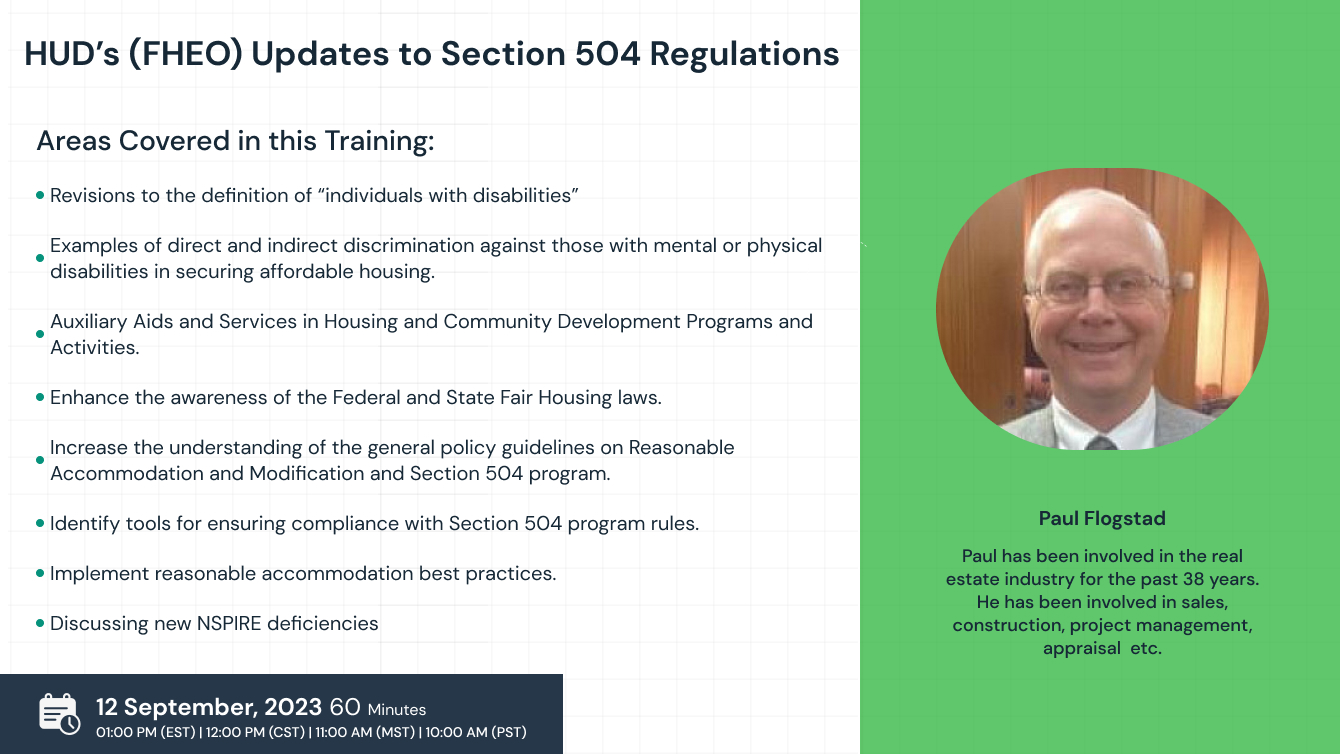Overview:
HUD’s current Section 504 rules, published in 1988, prohibit specific acts of discrimination and impose accessibility requirements on new construction and alterations to existing buildings. New issues and concerns have arisen in the intervening 35 rules that the existing regulations do not address.
HUD’s proposed overhaul of its Section 504 rules provides an opportunity to address questions raised by HUD and to offer suggestions about how its Section 504 rules should be updated. Considering the costs and risks they impose; HUD’s Section 504 rules have had a tremendous day- to-day impact on housing providers and managers. Section 504 complaints comprise the largest share of program-related civil rights claims handled by HUD, according to this week’s announcement. The promised overhaul could impose additional duties on owners and managers, or alternatively, could provide clarity that is missing now. It’s important for housing providers and managers to seize this opportunity to share their experiences with HUD and to make sure, as HUD starts to revise its Section 504 rules, that their voices and concerns are heard.
Areas covered in this Training:
New proposed rules affecting Section We will cover many of these proposed rule changes. These include:
-Revisions to the definition of “individuals with disabilities” to be consistent with the ADA Amendment Acts of 2008 and DOJ’s Title II ADA regulations.
-Examples of direct and indirect discrimination against those with mental or physical disabilities in securing affordable housing.
-Auxiliary Aids and Services in Housing and Community Development Programs and Activities.
-Enhance the awareness of the Federal and State Fair Housing laws.
-Increase the understanding of the general policy guidelines on Reasonable Accommodation and Modification and Section 504 program.
-Identify tools for ensuring compliance with Section 504 program rules.
-Implement reasonable accommodation best practices.
-We will cover all 13 proposed rule changes.
Why Attend this Training:
In announcing its planned overhaul, HUD acknowledged that its existing Section 504 rules need to be updated to address emerging issues and solicited comments on a variety of questions about the current Section 504 rules and how they should be revised. These include, among others, questions about whether the current definition of an “individual with disabilities” should be changed; whether the current new construction rules, requiring 5% of units be mobility-accessible and 2% of units be visual- and hearing-accessible, adequately meet the needs of persons with disabilities; and whether the accessibility needs of persons receiving housing choice vouches and other tenant-based assistance are being met.
Suggested Attendees:
-Property Managers
-Property owners
-Leasing Consultants
-Housing Authority Staff
-Compliance staff
-Developers

Paul Flogstad
Paul has been involved in the real estate industry for the past 38 years. He has been involved in sales, construction, project management, appraisal, property management, and property management consulting/training.
Through his consulting company, Property Management Solutions, he provides training and consulting services nationwide to owners, management companies, multi-housing associations, as well as state and federal agencies.
He specializes in fair housing issues and has developed fair housing and outreach programs for governmental agencies as well as conducting seminars which are presented to property management companies, apartment associations, and the general public nationwide. Most recently, he has been a consultant to the State of South DakotaSept
For over twenty years he was involved in the appraisal of residential, multi-family, farm, and commercial properties throughout the Midwest. Most recently, he was a consultant for affordable, multi-housing properties in 22 different states. This involved properties in HUD, Rural Development, HOME, and Tax Credit programs.

ACCREDITATIONS


